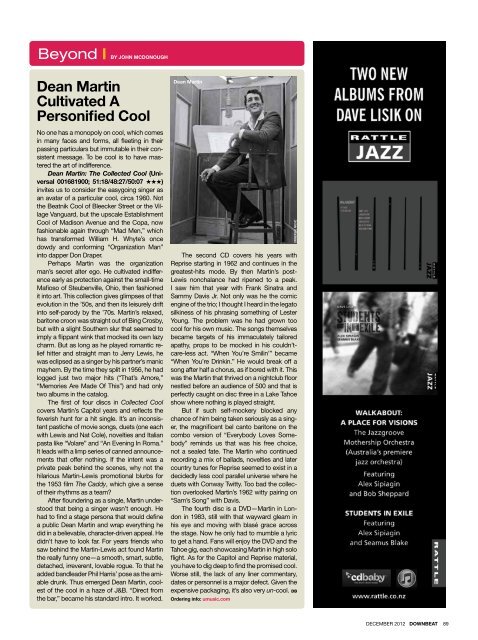Ron Carter Esperanza Spalding - Downbeat
Ron Carter Esperanza Spalding - Downbeat
Ron Carter Esperanza Spalding - Downbeat
Create successful ePaper yourself
Turn your PDF publications into a flip-book with our unique Google optimized e-Paper software.
Beyond | By john mcdonough<br />
Dean Martin<br />
Cultivated A<br />
Personified Cool<br />
No one has a monopoly on cool, which comes<br />
in many faces and forms, all fleeting in their<br />
passing particulars but immutable in their consistent<br />
message. To be cool is to have mastered<br />
the art of indifference.<br />
Dean Martin: The Collected Cool (Universal<br />
001681900; 51:18/48:27/50:07 HHH)<br />
invites us to consider the easygoing singer as<br />
an avatar of a particular cool, circa 1960. Not<br />
the Beatnik Cool of Bleecker Street or the Village<br />
Vanguard, but the upscale Establishment<br />
Cool of Madison Avenue and the Copa, now<br />
fashionable again through “Mad Men,” which<br />
has transformed William H. Whyte’s once<br />
dowdy and conforming “Organization Man”<br />
into dapper Don Draper.<br />
Perhaps Martin was the organization<br />
man’s secret alter ego. He cultivated indifference<br />
early as protection against the small-time<br />
Mafioso of Steubenville, Ohio, then fashioned<br />
it into art. This collection gives glimpses of that<br />
evolution in the ’50s, and then its leisurely drift<br />
into self-parody by the ’70s. Martin’s relaxed,<br />
baritone croon was straight out of Bing Crosby,<br />
but with a slight Southern slur that seemed to<br />
imply a flippant wink that mocked its own lazy<br />
charm. But as long as he played romantic relief<br />
hitter and straight man to Jerry Lewis, he<br />
was eclipsed as a singer by his partner’s manic<br />
mayhem. By the time they split in 1956, he had<br />
logged just two major hits (“That’s Amore,”<br />
“Memories Are Made Of This”) and had only<br />
two albums in the catalog.<br />
The first of four discs in Collected Cool<br />
covers Martin’s Capitol years and reflects the<br />
feverish hunt for a hit single. It’s an inconsistent<br />
pastiche of movie songs, duets (one each<br />
with Lewis and Nat Cole), novelties and Italian<br />
pasta like “Volare” and “An Evening In Roma.”<br />
It leads with a limp series of canned announcements<br />
that offer nothing. If the intent was a<br />
private peak behind the scenes, why not the<br />
hilarious Martin-Lewis promotional blurbs for<br />
the 1953 film The Caddy, which give a sense<br />
of their rhythms as a team?<br />
After floundering as a single, Martin understood<br />
that being a singer wasn’t enough. He<br />
had to find a stage persona that would define<br />
a public Dean Martin and wrap everything he<br />
did in a believable, character-driven appeal. He<br />
didn’t have to look far. For years friends who<br />
saw behind the Martin-Lewis act found Martin<br />
the really funny one—a smooth, smart, subtle,<br />
detached, irreverent, lovable rogue. To that he<br />
added bandleader Phil Harris’ pose as the amiable<br />
drunk. Thus emerged Dean Martin, coolest<br />
of the cool in a haze of J&B. “Direct from<br />
the bar,” became his standard intro. It worked.<br />
Dean Martin<br />
The second CD covers his years with<br />
Reprise starting in 1962 and continues in the<br />
greatest-hits mode. By then Martin’s post-<br />
Lewis nonchalance had ripened to a peak.<br />
I saw him that year with Frank Sinatra and<br />
Sammy Davis Jr. Not only was he the comic<br />
engine of the trio; I thought I heard in the legato<br />
silkiness of his phrasing something of Lester<br />
Young. The problem was he had grown too<br />
cool for his own music. The songs themselves<br />
became targets of his immaculately tailored<br />
apathy, props to be mocked in his couldn’tcare-less<br />
act. “When You’re Smilin’” became<br />
“When You’re Drinkin.” He would break off a<br />
song after half a chorus, as if bored with it. This<br />
was the Martin that thrived on a nightclub floor<br />
nestled before an audience of 500 and that is<br />
perfectly caught on disc three in a Lake Tahoe<br />
show where nothing is played straight.<br />
But if such self-mockery blocked any<br />
chance of him being taken seriously as a singer,<br />
the magnificent bel canto baritone on the<br />
combo version of “Everybody Loves Somebody”<br />
reminds us that was his free choice,<br />
not a sealed fate. The Martin who continued<br />
recording a mix of ballads, novelties and later<br />
country tunes for Reprise seemed to exist in a<br />
decidedly less cool parallel universe where he<br />
duets with Conway Twitty. Too bad the collection<br />
overlooked Martin’s 1962 witty pairing on<br />
“Sam’s Song” with Davis.<br />
The fourth disc is a DVD—Martin in London<br />
in 1983, still with that wayward gleam in<br />
his eye and moving with blasé grace across<br />
the stage. Now he only had to mumble a lyric<br />
to get a hand. Fans will enjoy the DVD and the<br />
Tahoe gig, each showcasing Martin in high solo<br />
flight. As for the Capitol and Reprise material,<br />
you have to dig deep to find the promised cool.<br />
Worse still, the lack of any liner commentary,<br />
dates or personnel is a major defect. Given the<br />
expensive packaging, it’s also very un-cool. DB<br />
Ordering info: umusic.com<br />
universal music<br />
DECEMBER 2012 DOWNBEAT 89
















